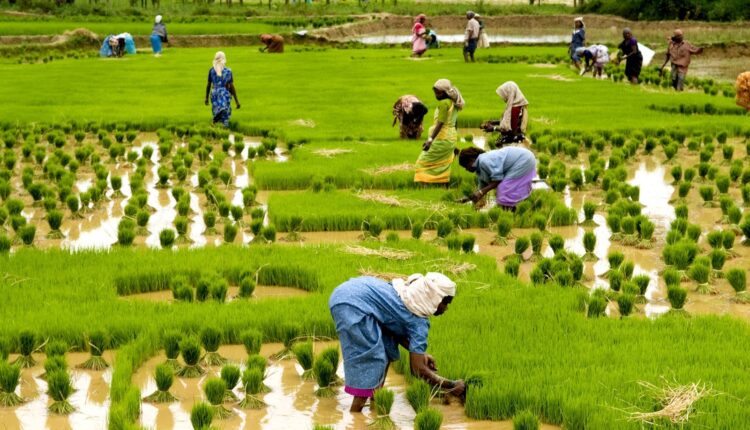In the age of rapid industrialization and mechanized farming, Sambamurthy Hanuman Veera Venkata Kommana stands as a beacon of hope for those who wish to see agriculture evolve sustainably, without losing its traditional essence. With his commitment to reviving and promoting Vedic farming practices, Sambamurthy is not just a farmer; he is a custodian of India’s ancient agricultural heritage.
The Legacy of Vedic Farming
Vedic farming, also known as Krishi Parashara, dates back to over 3,000 years and finds its roots in the Vedic scriptures—Rigveda, Yajurveda, Samaveda, and Atharvaveda. The practices are detailed in the Krishi Parashara, an ancient text that outlines sustainable farming methods based on natural inputs, indigenous cattle, and cosmic cycles. It emphasizes the importance of living in harmony with nature and farming in a way that nurtures the soil, biodiversity, and the health of those who consume the produce.
Sambamurthy’s Journey into Vedic Farming
Sambamurthy’s dedication to Vedic farming is deeply rooted in his family’s legacy. His grandfather, a freedom fighter and a pioneer in promoting sustainable agricultural practices, started Vedic farming on their ancestral land over a century ago. Sambamurthy inherited this knowledge, and with each generation, his family refined and expanded these traditional techniques.
Starting with just 1.5 acres of his own land, Sambamurthy today cultivates up to 40 acres through annual leases. His farm, located in Andhra Pradesh, serves as a model for other farmers looking to transition to organic and sustainable methods.
Techniques and Practices in Vedic Farming
1. Reviving Soil Health with Honey-Coated Ploughs:
One of Sambamurthy’s most notable techniques is the application of wild honey on the plough before tilling. As per Krishi Parashara, this practice attracts beneficial microbes that help decompose organic matter, increase nitrogen fixation, and improve soil fertility. This technique, though ancient, has a profound scientific basis as it enhances soil microbiology, leading to healthier crops.
2. The Use of Panchagavya:
Panchagavya is a potent organic mixture made from cow dung, cow urine, milk, curd, and ghee. According to the Vedas, this blend acts as a growth promoter and immunization agent for crops. Sambamurthy prepares Panchagavya using the dung and urine of native Indian cows, ensuring the highest quality. It is used both as a foliar spray and soil drench, enriching the soil with beneficial bacteria and acting as a natural pesticide.
3. Indigenous Seeds and Crop Rotation:
A key principle of Vedic farming is the preservation and propagation of indigenous seeds. Sambamurthy has collected over 200 varieties of native rice, each with unique characteristics suited to different soil types and climate conditions. He carefully documents their attributes, ensuring that the knowledge is passed on to future generations.
He follows a meticulous crop rotation strategy to maintain soil health and prevent pest infestations. A typical cycle on his farm would include a rotation between rice, pulses, oilseeds, and vegetables. This not only replenishes the soil but also provides a diversified income stream.
4. Desi Bulls for Tilling:
Sambamurthy emphasizes the use of indigenous bulls for ploughing, as their lighter weight minimizes soil compaction. He believes that the relationship between the farmer and his cattle is integral to the success of Vedic farming. The bulls, fed with a special diet of native grasses, provide the perfect synergy of strength and gentleness required for traditional tilling.
5. Water Management Using Pond Soil:
The Vedic system promotes using local resources for soil and water management. Sambamurthy uses pond soil rich in organic matter and essential minerals to improve the structure and water-holding capacity of his fields. This ensures that his farm is resilient to dry spells and can maintain soil moisture even in adverse conditions.
6. Multilayer Cropping and Companion Planting:
Vedic farming advocates the concept of multilayer cropping, where different plants are grown together to maximize the use of space and resources. For example, Sambamurthy grows legumes like toor dal and moong dal along with his main crop of rice. The legumes fix nitrogen in the soil, which benefits the rice plants, while the rice stalks provide a microclimate for the legumes.
7. Natural Pest Control Using Herbal Extracts:
Instead of relying on chemical pesticides, Sambamurthy uses a combination of neem oil, garlic, ginger, and wild herbs as pest repellents. These are prepared as per formulations found in ancient texts and have proven to be effective against a range of pests, from insects to fungal infections.
Impact and Recognition
Sambamurthy’s efforts have garnered national attention, earning him several prestigious awards:
• Vedic Indigenous Seed Award (2021): This award, given by the Ganapathi Sacchidaananda Swami Trust in Mysore, recognized his exceptional work in preserving and propagating indigenous seeds.
• Best Vedic Farmer Krishi Award (2022): Presented by Vice President Venkaiah Naidu, this award highlighted his dedication to chemical-free, sustainable farming practices.
• Best Chemical-Free Farming Award (2022): This recognition by former Andhra Pradesh Minister Kamineni Srinivas celebrated his pioneering efforts in promoting organic farming in Andhra Pradesh.
• Farm for Indigenous Agriculture Movement (FIAM) Award (2024): Awarded in West Bengal, this honor underscored his contribution to the indigenous farming movement at a national level.
Training and Outreach
Sambamurthy believes that knowledge must be shared to have a lasting impact. He has trained over 15,000 farmers through workshops and on-field demonstrations. Each year, he organizes free training sessions on his farm, where farmers learn about soil health management, seed preservation, and the preparation of organic fertilizers and pesticides.
A Farm Built on Tradition and Innovation
With just 1.5 acres of personal land and an additional 40 acres leased annually, Sambamurthy’s farm is a living testament to how ancient wisdom can coexist with modern techniques. His grandfather, a freedom fighter, initiated this Vedic farming practice over a century ago, and Sambamurthy is now the third generation to continue this legacy.
Despite the challenges of the modern agricultural landscape—ranging from labor shortages to market fluctuations—he remains committed to his principles. He occasionally integrates newer techniques, such as lightweight machinery, to adapt to the changing needs without compromising on the core tenets of Vedic farming.
Challenges and Adaptation in vedic farming
While Sambamurthy remains true to his Vedic principles, he is not resistant to change. In recent years, labor shortages have compelled him to introduce lightweight machinery in some parts of his farm. However, he is careful to ensure that these tools do not harm the soil structure or biodiversity. He completely avoids heavy harvesters, which he believes disrupt the delicate balance of the soil.
The Way Forward in vedic farming
Sambamurthy’s work is a shining example of how ancient practices can be adapted to address contemporary agricultural issues. As more farmers face the challenges of soil degradation, pest resistance, and climate change, the principles of Vedic farming offer a pathway to sustainable, high-quality production.
By combining the wisdom of the past with the innovations of the present, Sambamurthy Hanuman Veera Venkata Kommana is not only preserving a cultural legacy but also paving the way for a healthier, more sustainable future for Indian agriculture.
By combining the wisdom of the past with the innovations of the present, Sambamurthy Hanuman Veera Venkata Kommana is not only preserving a cultural legacy but also paving the way for a healthier, more sustainable future for Indian agriculture.
Also Read: Punarnava Jal – The world’s first organic fertilizer! Know how it is beneficial for farmers?
Contact us – If farmers want to share any valuable information or experiences related to farming, they can connect with us via phone or whatsapp at 9599273766 or you can write to us at “[email protected]”. Through Kisan of India, we will convey your message to the people, because we believe that if the farmers are advanced then the country is happy.
You can connect with Kisan of India on Facebook, Twitter, and Whatsapp and Subscribe to our YouTube channel.



